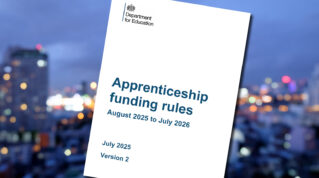More must be done to address falling apprenticeship starts in early years providers amid the sector’s staffing crisis, Ofsted’s chief has said.
But Amanda Spielman has also warned against using apprentices to replace “skilled, experienced practitioners”, which “isn’t fair to children or apprentices” and “can’t be a long-term solution”.
Spielman told Saturday’s Ofsted Big Conversation that apprenticeships are a part of the solution to address declining staff numbers in the early years sector, but said that “unfortunately fewer young people are even beginning these programmes at the moment”.
According to the education watchdog, the number of new apprentices starting in the sector had fallen from 27,000 six years ago to just 16,000 last year – a 40 per cent fall.
Among the issues she highlighted were delays in employers releasing apprentices for their off-the-job training.
“This may seem like a short-term fix, but it can delay or disrupt their training and cause problems down the road,” she said.
The chief inspector said Ofsted has also seen “some providers using apprentices to replace skilled, experienced practitioners”, adding that this “can’t be a long-term solution and it isn’t fair to the apprentices, or to children”.
Spielman said she hoped that a recent consultation on improving level 3 early years educators course criteria will help inform necessary changes, explaining that “it’s so important that people coming into the sector get off to the right start, and this means equipping them with the knowledge they need”.
A study published by the Social Mobility Commission and carried out by the Education Policy Institute in August 2020 found that low pay, a high workload, long working hours and lack of career development were impacting on staff retention in the early years sector.
It found that fewer than one in five early years workers received job-related training, and more than a third left their employer within two years.
Ofsted’s annual report last year said that early years workers were opting for higher paid or more flexible careers, and warned that while staffing problems had not affected inspection judgements to date, quality could be affected in future if experienced staff continued to leave the industry.
It reported that nurseries were becoming “over-reliant” on apprentices to fill gaps.
Michael Freeston, director of quality improvement at the Early Years Alliance, said the decline in apprenticeships is “disappointing but sadly not surprising” and said it is “vital” that funding for those standards is reviewed and increased.
“There’s no doubt that completing an apprenticeship provides a solid foundation for a career in the early years, but currently it can be costly for settings and training providers which, in turn, act as a disincentive.”
Freeston said that the combination of demanding hours and low pay deterred people from joining the sector, but said the organisation has also found that it can be difficult for employers to take on apprentices.
“Course requirements often incur additional expenses which are not completely covered by funding,” he said.
“The commitment to regular reviews and mentoring requirements can also place pressure on settings, especially when they are already facing limited budgets and limited resources due to sustained sector underfunding.”
The alliance reported that many training providers have stopped offering level 2 apprenticeship courses because the income did not match the cost of delivery.
The level 3 early years educator apprenticeship standard was introduced in 2019, while the education and childcare T Level was among the first three T Levels to be launched in September 2020, and includes a minimum of nine weeks on placement with an employer, or 21 weeks for the early years educator specialism.
In 2021, the Institute for Apprenticeships and Technical Education approved a level 5 early years lead practitioner apprenticeship to provide more career progression for those who had achieved a level 3 apprenticeship in the sector.

















This really does show how out of touch OFSTED is with reality.
T Levels were modelled on early years study programmes and have been used by employers for years to support the staff ratios and keep cost down.
Why would an employer take on an apprentice when there is a ready supply of T level candidates, hence the reduction in starts and guess what the employer gets even more free time from the learner and incentives as well
Madness but OFSTED need to wake up and smell the coffee and understand the dynamics of industry
Cheap labour. A family member of mine started as an apprentice at a nursery and was told that any training must be done on her own time, the place was pretty much run by apprentices, with a high turnover and staff generally treated very poorly. She is turned off apprenticeships now, despite my efforts to show here that there are good and genuine apprenticeships out there.
Incentives probably amplified the problem if there was already a high prevalence of rogues.
IfATE and DfE would do well to look beyond achievement rates of providers and look at the turnover of apprentices by employer and whether those employers switch providers. All the accountability is aimed at providers, but there are employers who are ‘inadequate’ and the apprenticeship brand suffers if they can continue to operate.